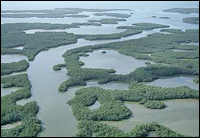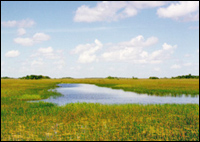The brutal hurricanes have passed, but now Florida is in the eye of the swirling swing-state storm — and environmental issues are being swept into the fray by high-ranking politicians and hot-ticket celebrities alike.

The Everglades are now faced with a campaign hurricane.
Photo: USGS. © Martin Miller.
With its 27 electoral votes — more than any of the other swing states — Florida could once again prove to be the big campaign prize. In early October, some pundits were predicting that Bush had the state sewn up — he was leading Kerry among Floridians by 7 percentage points according to the Quinnipiac poll and 4 points according to the Mason-Dixon poll. But now the two are just about neck and neck according to those same polls, while others, such as the new Reuters/Zogby poll, are showing Kerry holding a small lead.
With the race so close and the stakes so high, both the Kerry and Bush camps have been revving up their political horsepower with big expenditures and celebrity appearances in the Sunshine State.
Take the press event at a wildlife refuge near Boynton Beach on Oct. 14, when Gov. Jeb Bush (R) announced a $1.5 billion “Acceler8” plan intended to jumpstart the long-stalled restoration of the Florida Everglades. The project will be funded with borrowed money from his brother George W. — who, God knows, doesn’t have a cent to spare. Nevertheless, officials from Dubya’s administration were front and center at the media event, doling out the big bucks and lapping up the photo ops.

The river of grass takes center stage.
Photo: USGS.
“This man [Jeb Bush] has had six years to do something on the Everglades. His brother has had four. They have done nothing. And all the sudden he’s deciding to announce it two weeks before the election in one of the most decisive swing states?” Carol Browner, head of the U.S. EPA under Clinton, balked in a chat with Muckraker. “I mean, come on. It was clearly an election-season gimmick.” Furthermore, said Browner, they’ve kept the public out of the planning process entirely, and have fast-tracked the project to such an extent that it could bypass certain environmental reviews. “I definitely have my doubts about how this project is going to play out,” she said.
Browner, meanwhile, was down in Tampa Bay last week stumping for Kerry with celebrity greenie Leonardo DiCaprio, who was roasting Bush’s environmental record and winning Dems the teenybopper vote. “I believe, without a doubt, this is the most important election of all of our lifetimes,” he told a largely female crowd at the University of Central Florida. “Over the past four years, George Bush has made the wrong choices, disastrous choices, when it comes to the environment.”
Browner insists the throngs weren’t there just to stargaze. “When we’d ask the rooms of 400 to 500 kids how many people are registered, all the hands go up,” she said. “These are kids who are registering for the first time to vote and they’re very, very responsive to the environmental message.”
Days earlier, Ted Danson had been campaigning in crowds of perhaps more mature Floridian women, along with actress Melissa Fitzgerald of The West Wing (who, it seems, likes to work on Democratic messaging even when she isn’t playing the assistant to White House Press Secretary C.J. Cregg). Danson warned that 15,000 Florida newborns a year are exposed to dangerous mercury levels in their mothers’ blood and breast milk, and he condemned Bush for failing to curb mercury emissions from coal-burning power plants. The Florida Department of Health in September put out a new mercury advisory, with expanded warnings about consumption of fish from the state’s waterways.
Lois Gibbs, the mom who took on Love Canal and helped instigate the creation of the Superfund in 1980, also stumped with Danson, saying that Bush has let the Superfund trust fund go bankrupt, and that 51 Superfund sites in Florida have inadequate funds for cleanup.
Environment2004 is the group corralling these big names, with the aim of mobilizing voters for Kerry. Aimee Christensen, the organization’s executive director, said that Environment2004 polled 500 undecided Floridian voters to determine how persuasive environmental messages would be. “We found that not only were messages about the health consequences of Bush’s environmental rollbacks effective, 71 percent said weakening water protections raised ‘serious’ or ‘very serious’ doubts about President Bush, while 77 percent said the toxic-waste cleanup issue raised ‘serious’ or ‘very serious’ doubts. That’s as effective as messages related to prescription drugs and outsourcing.”
Susan Glickman, Florida state director for Environment2004, added, “Tourism is the biggest industry in Florida, agriculture is the second biggest, so these voters are primed for an environmental message — particularly since hurricanes have hurt both industries recently. The message is: We literally can’t afford four more years of George Bush.”
To wit, Environment2004 is holding a press conference this week in Tallahassee to address global warming’s impacts on Florida, focusing on coral reefs and intensified hurricane activity, with speakers Alexandra Cousteau (granddaughter of Jacques) and climate expert Michael Oppenheimer of Princeton University.
There’s also more star power waiting in the wings: Meg Ryan and Robert F. Kennedy Jr. will hit Tampa on Tuesday for a big-ticket event focused on what Kennedy calls Bush’s “crimes against nature.”
But the green lobby’s fiercest firepower is coming in the form of a $3 million TV ad campaign that the League of Conservation Voters has just launched in Florida, which makes LCV the largest spender in the state in the final two weeks of the presidential race outside the Bush and Kerry campaigns themselves, according to Mark Longabaugh, the group’s senior vice president of political affairs. The LCV ad calls Bush and Cheney “Big Oil’s best friends” and criticizes the administration’s connections to Halliburton and corporate polluters, issues that could sway voters in a state where offshore oil drilling is decidedly unpopular.
“We obviously wouldn’t have committed $3 million if we thought Florida was sewn up for Bush,” said Longabaugh.

